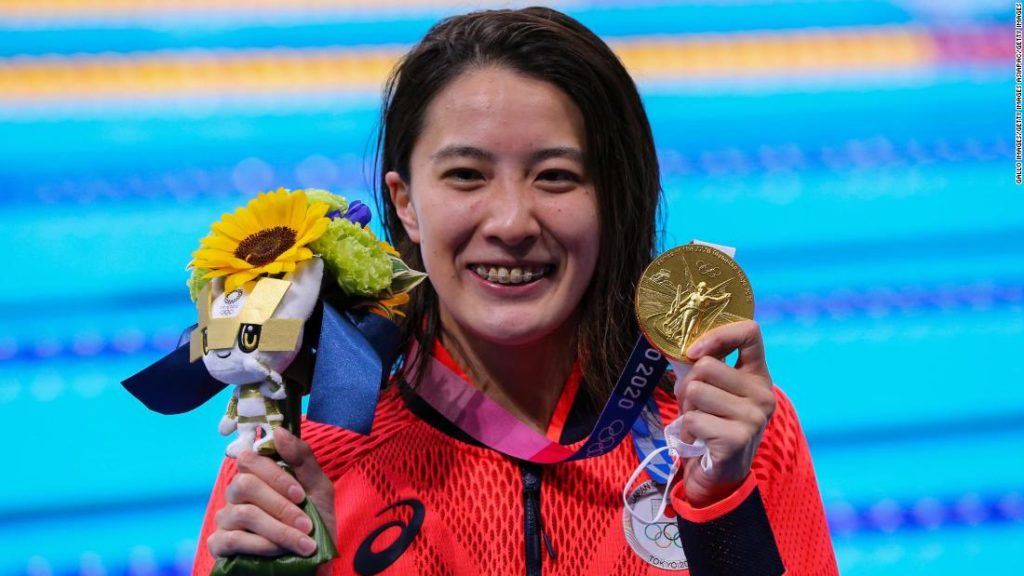With her victory, she became the first Japanese woman ever to clinch two gold medals in a single Games, after she also claimed the 400m individual medley the week before.
It made Tokyo 2020 the seventh straight Olympics where the winner of the women’s 200m and 400m individual medley has been the same person.
Completing the race with a time of 2:08.52, Ohashi finished in front of Team USA’s Alex Walsh and Kate Douglass, who took silver and bronze respectively.
“I was thinking I might lose, I might not be able to catch up, even up to 15 meters left, but I had won the gold medal in the first race, so I was able to relax a lot, and I told myself to try and do my best so that I could finish without any regret,” she adds.
Feeling the pressure
In the lead up to her double-gold triumph, Ohashi, like many athletes, had to deal with the voices of opposition to the Olympics, and the question of whether or not they should really be held — while also juggling the pressure of competing on a global stage.
“We, the athletes, went into the Olympics with a great deal of confusion,” Ohashi says.
Hitting rock bottom
The pandemic wasn’t the only challenge that Ohashi faced during her journey to becoming a double-Olympic champion.
In 2015, she was frequently experiencing fatigue, and despite training, her times were getting worse. That year, she competed in the national championships, where she found herself with the worst time of all 40 competitors who entered the 200m individual medley.
Once she switched up her medication and diet, her condition began to improve. Two years later, her hard work came into fruition when she won a silver medal in the 200m individual medley at the 2017 FINA World Championships.
“I won a medal at the World Championships in 2017, but then I started feel pressure, and there were times when I couldn’t control it, but that experience helped me to control my feelings,” she tells CNN Sport.
But Ohashi faced yet another obstacle in 2019, when the pressure of competing began to take a toll on her mental health, in the form of anxiety. At the 2019 FINA World Championships, she was disqualified because of a stroke rule violation — in the same event where she had won silver two years prior.
Finding strength in solidarity
That’s why the 25-year-old Ohashi empathizes with other young athletes who have spoken out about how the burden of expectation can weigh heavily, especially on young shoulders.
Even though both athletes were each met with support from peers including Aly Raisman, Usain Bolt and Serena Williams, they also received judgment, ridicule and criticism from others.
Either way, Ohashi hopes that Biles’ and Osaka’s ability to talk openly about their mental health will encourage people to show more care and compassion to those who experience similar struggles.
“There are probably a lot of athletes who have mental health problems, but I hope that the world will become more supportive,” she says. “I’m sure there are athletes who will be saved by them coming out, and I respect their courageous action.”
‘It was a miracle’
Having come back from rock bottom in 2019 to win bronze in the 400m individual medley at that year’s FINA World Championships, Ohashi says that going through physical and mental hardships has only helped her grow as an athlete.
“There were times when it felt so hard and I almost gave up swimming, but now I feel that everything paid off,” she says.
Reflecting on her stellar run at Tokyo 2020, she says, “Of course, I came this far dreaming of winning a gold medal, but I never thought for a moment that I could win a gold medal, even though I had imagined it.”
“I am proud of myself for winning two gold medals at the Tokyo Olympics, and I believe that my victory could encourage the Japanese swimming and sports worlds in the future,” she adds.
For Ohashi, her two gold medals stand for something bigger than a double-Olympic victory. She hopes her ability to overcome adversity and make Olympic history can inspire hope — and help to heal a divided nation.
“I’ve received a lot of comments from people who said they were moved by athletes winning gold medals and other medals, seeing athletes trying so hard, so I’m very happy about that,” she says.
“It was a miracle for me to participate in the Olympic Games in my own country, so it was a big event for me, and I hope that I was able to inspire people — it might be strange to say this but — inspire those who were against the Games, or people who were not so interested in sports, and I hope I’ve encouraged them even a bit.”
You may also like
-
Super League: UEFA forced to drop disciplinary proceedings against remaining clubs
-
Simone Biles says she ‘should have quit way before Tokyo’
-
Kyrie Irving: NBA star the latest to withhold vaccination status
-
Roger Hunt: English football mourns death of Liverpool striker and World Cup winner
-
‘Every single time I lift the bar, I’m just lifting my country up’: Shiva Karout’s quest for powerlifting glory

